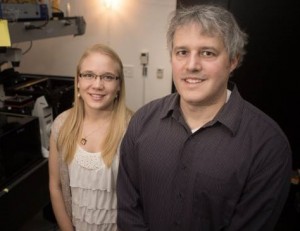Turning cellulose into biofuel: VU prof, grad student search for key on molecular level
Originally published by the Vanderbilt School of Engineering found here.
Nature exquisitely engineered a way to produce fuel from organic matter. The answer to how lies in decaying leaves on the forest floor or a backyard compost pile and the tiny amounts of energy those produce.
Without understanding how enzymes are working to break down organic matter on the molecular level, human engineers can’t apply the process to untold areas of research, including the significant promise of efficient and plentiful biofuels.
Matt Lang, professor of chemical and biomolecular engineering, and Sonia Brady, a Ph.D. candidate in chemical engineering, are beginning to decode the process.
Lang studied motor proteins before coming to Vanderbilt University from MIT, often in the context of medical applications — areas such as cell division or protein degradation. When he arrived, faculty at Vanderbilt introduced him to cellobiohydrolase enzymes and how they break down cellulose, the most abundant organic polymer on Earth.
Through cross-disciplinary collaborations, Lang and Brady were able to take that process down to a single-molecule assay.
Traditional research involved applying bulk sets of enzymes to cellulose, making it impossible to know specifically how they were breaking it down to basic sugars. Without that information, how to develop biofuels from cellulose would remain a mystery.
Ethanol, derived from corn, provides a good context to explain Lang and Brady’s research. It’s simple to make because it converts starch in the corn itself into fuel. Brady and Lang want to break down cellulose in the corn husks — or from other feedstocks that can be grown more quickly and pull fewer nutrients from the soil than corn.
“It’s a big issue. Our part is like this,” Brady said, holding her hands almost together.
Brady, who credits her father’s work in the oil industry with her interest in alternative fuel sources, arrived at Vanderbilt in the fall of 2011 from Trinity University in San Antonio. She won the Department of Chemical and Biomolecular Engineering’s teaching assistant award her first year.
Read the full article here.


Leave a Response